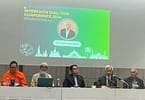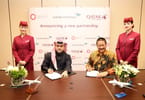LIMA, Peru – World Tourism Day (September 27, 2008) – TOURpact.GC was launched by the UN Global Compact and UNWTO, on the occasion of the official World Tourism Day (WTD) celebrations in Lima, Peru. It was welcomed by UN Secretary General Ban Ki-moon as a leadership initiative with a potential for other sectors. It is a voluntary mechanism to provide a corporate social responsibility framework, open to Companies, Associations and other Tourism Stakeholders who are Affiliate Members of UNWTO. TOURpact.GC reflects the aligned principles of the Global Compact and UNWTO’s Global Code of Ethics for Tourism. The Global Compact is a voluntary initiative designed to mainstream ten key principles of social responsibility in business activity and to catalyze action to support the UN Millennium Development Goals (MDGs). Participants will make four Commitments:
1 – To embrace the Principles of the initiative, which will be drafted on the basis of the UN Global Compact principles and the UNWTO Usoro ụkpụrụ omume zuru ụwa ọnụ maka njem nlegharị anya.
2 – To promote their awareness and implementation with business partners, in their supply chain, with customers and staff.
3 – To use the logo and the collateral in their corporate social responsibility campaigns.
4 – To report annually on their plans and progress.
The complex interfaces within tourism markets and supply chains call for widespread coordination between institutions at local, national and international levels, if quality products and services are to be delivered. This is even more challenging in poor countries, developing markets and small island states.
The Global Compact
Ihe Ndị Ruuru Mmadụ
o Support Framework & Respect Rights
o No Abuses
Labor Standards
o Support Association & Bargaining
o No Compulsory Labor
o No Child Labor
o No Employment Discrimination
Environment
o Support Precautionary Principle
o Respond proactively
o Encourage new Technology
Anti-Corruption
o Oppose all forms of corruption
The Global Code of Ethics
o Mutual Understanding & Respect
o Collective & Individual Fulfillment
o Sustainable Development
o Protector of Cultural Heritage
o Beneficial for Host Communities
o Obligations of Stakeholders
o Rights to tourism
o Liberty of Tourism Movement
o Rights of Workers & Entrepreneurs
o Commitment to Implementation
UNWTO is the leading international tourism body. It advances responsible, sustainable and universally accessible tourism and in so doing promoting socioeconomic growth and people-to-people understanding. As the central and decisive tourism agency in the UN it strongly supports the MDGs. Its State Members as well as its Private Sector, Academic, Community and NGO Affiliate Members are committed to a Global Code of Ethics (GCE) and to Public/Private Partnerships (PPP’s) to deliver this kind of tourism.
The UN Global Compact is a framework for businesses that are committed to aligning their operations and strategies with ten universally-accepted principles in the areas of human rights, labor, the environment and anti-corruption. As the world’s largest, global corporate citizenship initiative, the Global Compact is first and foremost concerned with exhibiting and building the social legitimacy of business and markets. Tourism is not only a major economic sector; it is one of the mainstays of international trade and a dynamic catalyst for many other sectors. Its role in environmental protection, in preserving biodiversity, in conserving cultural heritage, in promoting mutual understanding among peoples and peace among nations, is highly significant. Moreover it is a massive job creator with a particularly important role in building infrastructure and market opportunities in local communities in poor and developing countries.
IHE Ị GA-Ewepụ na edemede a:
- The Global Compact is a voluntary initiative designed to mainstream ten key principles of social responsibility in business activity and to catalyze action to support the UN Millennium Development Goals (MDGs).
- The UN Global Compact is a framework for businesses that are committed to aligning their operations and strategies with ten universally-accepted principles in the areas of human rights, labor, the environment and anti-corruption.
- Moreover it is a massive job creator with a particularly important role in building infrastructure and market opportunities in local communities in poor and developing countries.






















